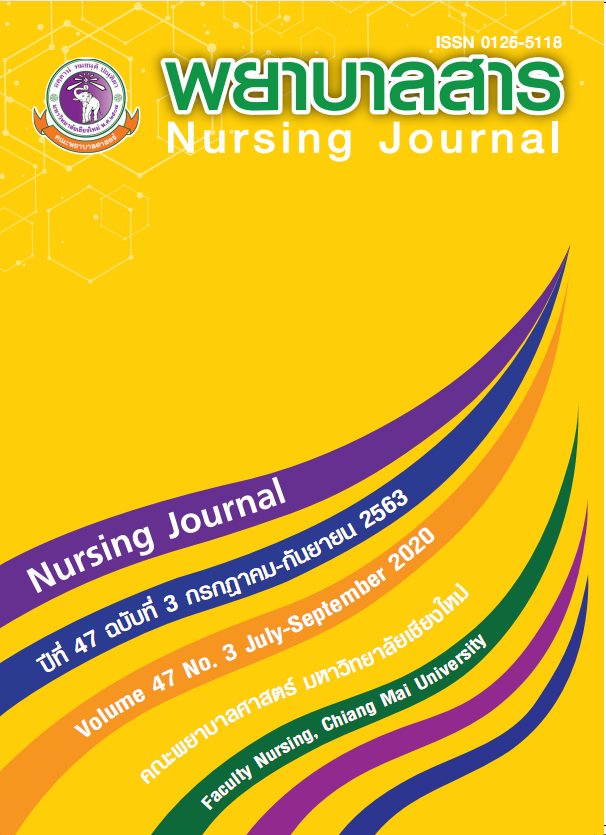Nursing Shared Governance as Perceived by Nurses in the Private Nursing Department, Maharaj Nakorn Chiang Mai Hospital
Keywords:
Nursing Shared Governance, promoting factors of nursing shared governance., Nursing Shared Governance, promoting factors of nursing shared governanceAbstract
Nursing shared governance is a management that allows nurses to participate in decisions and will empower nurses to deliver high-quality patient care. The objective of this study was to explore the perception of nursing shared governance and study the promoting factors of nursing shared governance among nurses in the Private Nursing Department, Maharaj Nakorn Chiang Mai Hospital. The population in this study was 132 professional nurses. Research instrument is a questionnaire that includes 2 parts: 1) The Index of Professional Nursing Governance (IPNG) Index developed by Hess (2010) which was translated into Thai by Natanong Pitchayakun (2019) The Cronbach’s alpha of IPNG was .97 and 2) The opened questions about promoting factors of nursing shared governance. The data was analyzed using descriptive statistics including frequency, percentage, mean, and standard deviation.
The results of study illustrated as follow:
- Nurses and nursing managers had equally shared in some subscales of nursing shared governance (m = 183.33, s = 47.16). Considering the scores of each subscale of the nursing shared governance, decisions equally shared by nurses and nursing managers in the control over personnel (m = 38.00, s = 14.11) and participation in committee structure (m = 24.05 (s = 7.92). Whereas decisions not equally shared by nurses and nursing managers in access to information (m = 36.80, s = 10.29), influence over resources that support the practice (m = 31.08, s = 47.16), control over professional practice (m = 35.78, s = 10.06) and goal setting & conflict resolution (m = 17.61, s = 5.89).
- Nurses reported that the promoting factors of nursing shared governance included the use of 360 degree feedback, giving nurses a greater autonomy, increasing hospital communication channels, and promoting nurses to conduct a research; innovation; and use evidence based practice in delivery patient care
The results of this study will be benefits for nursing administrators to conduct activities which could enhance nurses to be actively involved in decision making about administration and nursing practice in hospitals.
References
Hess, R. (2014). Implementing shared governance: No turning back. Nurse Leader, 12(4), 40-42.
Hess, R. (2010). The Measurement of Professional Governance: Scoring Guidelines and Benchmarks. Forum for Shared govermance, 1-23.
Kanter, R. M. (1979). Power failure in management circuits. Classics of organization theory, 342-351.
Methawin, D. (2009). Nursing personnel development potential creating research from regular work in Phayao Hospital. Journal of Nursing Division, 36(2), 46-55. (In Thai)
Manokarn, C. & Aumtani, A. (2012). The study of environmental elements suitable for Work of a professional nurse. Thai Journal of Nursing Council, 22(2), 57-57. (In Thai)
Maisutha, A. & Sachuck, S. (2011). Performance appraisal (18th ed.). Bangkok: Technology Promotion Association Ltd. (In Thai)
Nursing department, Maharaj Nakorn Chiang Mai Hospital.(2019). Self assessment report of the nursing department, Maharaj Nakorn Chiang Mai Hospital. Faculty of Medicine Chiang Mai University. (In Thai)
Pitchayakoon, N. ( 2019). Knowledge, Attitude, Shared governance and Practice of Registered
Nurses Regarding Advance Directive. Master of Nursing Science (Adult Nursing). Faculty of Nursing, Chiang Mai University. (In Thai)
Puttaruksa, L., Subgranon, R., & Othaganont., P. (2016). Factors Leading to Success in the Implementation of Evidence Based Nursing Practice of Professional Nurses. The Journal of Faculty of Nursing Burapha University, 24(3), 94-103. (In Thai)
Sangthong, B. & Wisetrit, W. (2009). The relationship between security management and working as a team, having independence in work and quality, the services of intensive care unit as perceived by professional nurses of intensive care units at Private Bangkok Hospitals. Journal of Nursing Science, 3(1), 47-58. (In Thai)
Siriboonkosai, K. (2011). Employee’s Cognitive and Attitude in 360 degree feedback performance appraisals and organizational commitment of Private Hospital in HuayKwang District. Master’s Project, M.B.A. (Management). Bangkok: Graduate School, Srinakharinwirot University. (In Thai)
Sasang,N., Pensirinapa,N., & Prasertchai,A. (2016). Empowerment and Organization Commitment of Professional Nurses in Thammasat University Hospital. Journal of The Royal Thai Army Nurses, 17(1), 79-87. (In Thai)
Sawangwan, P., Keitlertnapha, P., & Nantsupawat, R. (2014). Head Nurse – Staff Nurse Exchange, Structural Empowerment and Innovative Behavior of Professional Nurses in Regional Hospitals. Nursing Journal, 41(1), 158-168. (In Thai)
Singjai, S., Pensirinapa, N., & Sitakalin, P. (2016). The Relationships between Personal Factors, Organizational Climate and Personnel Participation in Risk Management in Community Hospitals, Chiang Mai Province. Nursing Journal, 43(5), 162-172. (In Thai)
Taylor, K. (2016). Using shared governance to empower nurses. Nursing times, 112(1-2), 20-23.
Waikasigorn, T. (2004). Nursing shared governance at ward level as perceived by professional nurses in regional hospital. Master of Nursing Science (Nursing Administration). Faculty of Nursing, Naresuan University. (In Thai)
Wilson, E. M. (2013). Evaluating shared governance for nursing excellence. Retrieved from https://core.ac.uk/download/pdf/62877482.pdf
Downloads
Published
How to Cite
Issue
Section
License
บทความที่ได้รับการตีพิมพ์เป็นลิขสิทธิ์ของวารสารพยาบาลสาร
ข้อความที่ปรากฏในบทความแต่ละเรื่องในวารสารวิชาการเล่มนี้เป็นความคิดเห็นส่วนตัวของผู้เขียนแต่ละท่านไม่เกี่ยวข้องกับมหาวิทยาลัยเชียงใหม่ และคณาจารย์ท่านอื่นๆในมหาวิทยาลัยฯ แต่อย่างใด ความรับผิดชอบองค์ประกอบทั้งหมดของบทความแต่ละเรื่องเป็นของผู้เขียนแต่ละท่าน หากมีความผิดพลาดใด ๆ ผู้เขียนแต่ละท่านจะรับผิดชอบบทความของตนเองแต่ผู้เดียว






